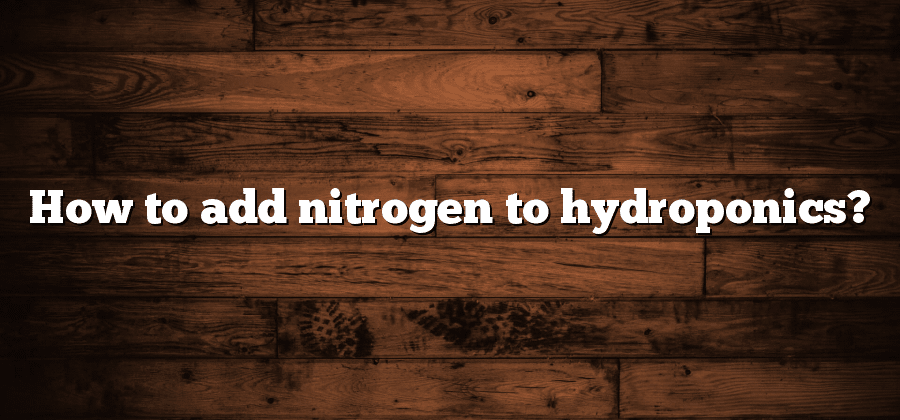Understanding the Role of Nitrogen in Hydroponics
Nitrogen is an essential element in hydroponics, playing a crucial role in various plant growth processes. Serving as a building block for proteins, enzymes, and chlorophyll, nitrogen is required for cell division, photosynthesis, and overall plant development. In hydroponic systems where plants are grown in a soil-less medium, it is important to provide an adequate supply of nitrogen to ensure optimal plant growth and yield.
One of the main functions of nitrogen in hydroponics is its involvement in photosynthesis. Through this process, plants convert light energy into chemical energy, utilizing carbon dioxide and water to produce glucose and oxygen. However, photosynthesis cannot take place without nitrogen. It is a key component of chlorophyll, the green pigment responsible for absorbing light energy. Without sufficient nitrogen, plants may suffer from limited chlorophyll production, resulting in stunted growth, pale leaves, and reduced photosynthetic efficiency. Therefore, maintaining proper nitrogen levels is crucial for promoting healthy and vigorous growth in hydroponic plants.
Selecting Nitrogen-Rich Nutrient Solutions for Hydroponic Systems
When it comes to hydroponic systems, selecting the right nutrient solutions is crucial for the healthy growth of plants. Nitrogen, a vital macronutrient, plays a significant role in the overall development of plants. It is responsible for promoting leafy growth, enhancing photosynthesis, and aiding in the production of proteins and enzymes. Thus, it is essential to choose nitrogen-rich nutrient solutions carefully to ensure optimal plant health and productivity.
One primary consideration when selecting nitrogen-rich nutrient solutions is the nitrogen content of the solution. Different nutrient solutions may contain varying levels of nitrogen, usually expressed as a percentage on the packaging. It is advisable to opt for solutions with a higher nitrogen content, as this will supply plants with an adequate amount of this essential nutrient for their growth and development. Additionally, it is crucial to consider the specific nitrogen form in the nutrient solution. While there are various nitrogen sources available, such as nitrate, ammonium, and urea, each has its advantages and disadvantages. Understanding the plants’ particular needs and preferences can help in determining the most suitable nitrogen source for your hydroponic system.
Exploring Different Nitrogen Sources for Hydroponics
Nitrogen is an essential nutrient for plants, playing a crucial role in their growth and development. In hydroponics, where plants are grown without soil, it becomes even more important to provide the right nitrogen sources to ensure optimal plant health. There are different nitrogen sources available for hydroponics, each with its own advantages and considerations.
One common nitrogen source used in hydroponics is ammonium nitrate. It is highly soluble and quickly absorbed by plants, making it an efficient choice. However, excessive use of ammonium nitrate can lead to an accumulation of nitrate ions, which may affect plant health. Another option is calcium nitrate, which not only provides nitrogen but also supplies calcium, an essential nutrient for plant growth. Calcium nitrate is less prone to nitrate accumulation, making it a popular choice among hydroponic growers.
Calculating the Nitrogen Requirements for Your Hydroponic Setup
Calculating the nitrogen requirements for your hydroponic setup is an essential step in ensuring optimal plant growth and productivity. Nitrogen, being a key macronutrient, plays a crucial role in various plant processes, including leaf and shoot development, chlorophyll production, and protein synthesis. By accurately determining the nitrogen needs of your hydroponic plants, you can provide them with the right amount of nutrient solution, preventing deficiencies or excesses that can hinder their growth.
To calculate the nitrogen requirements for your hydroponic setup, you first need to consider factors such as the crop type, growth stage, and desired yield. Different crops have varying nitrogen requirements, with some being more nitrogen-demanding than others. Additionally, the growth stage of your plants will also influence their nitrogen needs, as younger plants require more nitrogen for vegetative growth, while flowering and fruiting stages require a slightly lower nitrogen concentration. Lastly, the expected yield plays a role in determining the overall nutrient requirements, as increased yield typically means increased nutrient demands. By taking these factors into account, you can precisely calculate the nitrogen requirements for your hydroponic setup, promoting healthy and vigorous plant growth.
Incorporating Organic Nitrogen Sources in Hydroponic Nutrient Solutions
In hydroponic systems, the selection of nutrient solutions plays a crucial role in providing the necessary elements for plant growth. Nitrogen, in particular, is one of the essential nutrients needed by plants to thrive. While there are various sources of nitrogen available for hydroponic nutrient solutions, the incorporation of organic nitrogen sources is gaining popularity among growers.
Organic nitrogen sources offer several advantages in hydroponics. Firstly, they provide a more sustainable and environmentally-friendly approach to plant nutrition. Organic matter, such as compost or manure, contains nitrogen in a form that is slowly released, ensuring a steady supply of nutrients to the plants over time. This slow-release characteristic helps prevent nutrient imbalances and reduces the risk of nutrient leaching into the surrounding environment. Additionally, organic nitrogen sources often contain other beneficial compounds, such as micronutrients and beneficial microorganisms, which can enhance plant growth and overall system health.






